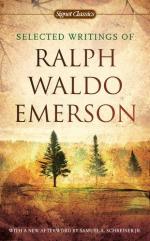
|
| Name: _________________________ | Period: ___________________ |
This test consists of 15 multiple choice questions and 5 short answer questions.
Multiple Choice Questions
1. What state does Emerson challenge in "Emancipation in the British West Indies"?
(a) Pennsylvania.
(b) Virginia.
(c) Rhode Island.
(d) Massachusetts.
2. How does Emerson describe Ripley?
(a) Cold.
(b) Overbearing.
(c) A natural gentlemen.
(d) Friendly to the point of being naive.
3. What age did Napoleon usher in that the West had yet to recover from, according to Emerson?
(a) Intellectualism and Spirituality.
(b) A fascination with New Age mysticism.
(c) Selfishness and materialism.
(d) The Industrial Age.
4. What kind of nature does Emerson say the farmer has?
(a) Beneficial.
(b) Innocent and pure.
(c) Hard-working.
(d) The kind of nature that teaches others life lessons.
5. Why does Emerson say Webster is wrong?
(a) He sided with slavery.
(b) He was a poor orator.
(c) He did not back up his claims with evidence.
(d) He verbally attacked President Abraham Lincoln.
6. What was John Brown's punishment after the revolt?
(a) Deportation.
(b) Execution.
(c) Probation.
(d) Imprisonment.
7. In what year did John Brown lead a revolt?
(a) 1857.
(b) 1858.
(c) 1859.
(d) 1860.
8. What kind of men do the hard work of farming?
(a) None of the answers is correct.
(b) Men of nature.
(c) Men of great faith.
(d) Men of endurance.
9. In what city was "Abraham Lincoln" presented?
(a) New York.
(b) Boston.
(c) Washington, D.C.
(d) Concord.
10. When is a dollar worth more, according to Emerson?
(a) When it is spent on a jail.
(b) When it is spent on a university.
(c) When it is used to repair roads and public buildings.
(d) When it is saved.
11. What do the Magna Carta, American Revolution, and habeas corpus reveal about the English?
(a) They will fight savagely for individual rights.
(b) They are prone to bureaucracy.
(c) They have a rich history.
(d) They have greatly influenced government all over the world.
12. What did Emerson think of slavery?
(a) He thought it was a necessary evil.
(b) He thought it would soon be obsolete as machines took the places of slaves.
(c) He thought it was inherently evil.
(d) He thought it could be reformed to be an effective practice.
13. Where was Carlyle from?
(a) Wales.
(b) England.
(c) Ireland.
(d) Scotland.
14. Where did Thoreau live?
(a) On Emerson's property.
(b) In rural Texas.
(c) In the Yosemite Valley.
(d) With friends and family, always moving.
15. What contemporary of Emerson's can be seen in his poem "Uriel"?
(a) William Wordsworth.
(b) Edgar Allan Poe.
(c) Samuel Taylor Coleridge.
(d) T. S. Eliot.
Short Answer Questions
1. What kind of income does the farmer usually earn?
2. Who were freed by the Emancipation Proclamation?
3. In what city did John Brown lead a revolt?
4. What is one danger of over-refinement?
5. When was Emerson's last trip to England?
|
This section contains 433 words (approx. 2 pages at 300 words per page) |

|




